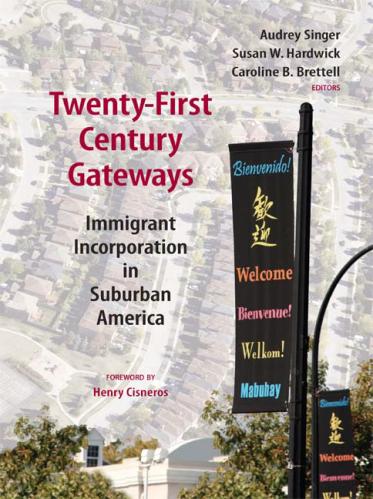As President Donald Trump begins his administration, this blog presents, on a weekly basis, a selection of what Brookings experts are writing and saying about the new administration’s early policy choices, personnel decisions, and engagements with domestic and global events. Here’s week two of the first 100 days. To receive daily updates on new Brookings research, commentary, and events, subscribe to our newsletters.
Read what Brookings experts had to say about the First 100 Days in: Week One.
TRUMP’S IMMIGRATION ORDER
Senior Fellow Benjamin Wittes says that the “malevolence of President Trump’s Executive Order on visas and refugees is mitigated chiefly—and perhaps only—by the astonishing incompetence of its drafting and construction.”
Also, watch this video:
Associate Fellow Jessica Brandt reviews five important facets about President Trump’s executive order on refugees and restricting immigration from seven majority-Muslim countries, concluding that “the order is harmful to America’s national security interests.”
Senior Fellow Suzanne Maloney focuses on the impact the order has had on Iranian travelers specifically, and the ripple effects it is having in the Middle East. She writes that “Trump’s immigration ban misjudged the American people, and it will prove a historic miscalculation for U.S. standing in the world and influence in the Middle East.”
Senior Fellow Daniel Byman, calling the executive order “immoral and un-American,” says “it’s also likely to fail on its own terms and lead to an increase in terrorist attacks against Americans,” which might, ironically, cause support for such policies to grow.
Senior Fellow Alan Berube supplies data on U.S. cities with the largest populations derived from the seven nations in the immigration restriction, and notes that the spread of protests beyond America’s largest cities “reflects a broad awareness that immigrants and refugees—from wherever they originate—add immensely to the social, economic, and cultural fabric of our country as a whole, and individual communities of all sizes and political persuasions.
TRADE POLICY
The Metropolitan Policy Program’s Amy Liu and Rachel Barker observe that President Trump’s trade stance is leading to “unease among business leadership groups” in metro areas around the country, including in Des Moines, San Diego, and Chicago.
Senior Fellow Mireya Solís writes that a Trans-Pacific Partnership minus the U.S. “can be a useful tool in deterring Trump’s protectionist policies” while the “costs of TPP rejection for the U.S. will begin to pile up.”
Joseph Parilla and Mark Muro from the Metropolitan Policy Program note that “changes in federal trade policy can have large implications for individual communities, whose reliance on trade can vary widely by dint of the tradability of their local industry mix and overall global orientation.” Their data reveals that the “export-intensity” of U.S. metros is highest in the smaller energy- and manufacturing-oreinted places, while the largest cities have the highest percentage of national exports.
Stuart Brotman, a nonresident senior fellow with the Center for Technology Innovation, offers some proposals on technology-specific concerns—such as were part of the TPP—in any bilateral trade agreements the Trump administration pursues.
DOMESTIC AND ECONOMIC POLICY
Senior Fellow Elaine Kamarck describes six areas of a government-wide reform agenda, including the budget process, federal contracting, federal regulation, and the civil service. She says that “starting with large, cross-cutting systemic reforms will yield advantages in both governmental cost and performance.”
Senior Fellow Stuart Butler says that the scale of U.S. health spending (more than the economies of Britain and France) and the system’s complexity mean that “legislation in a complex sector like health care must always be crafted to permit continuous adaptation, and never a truly finished product.” He proposes three legislative strategies for replacing the Affordable Care Act.
Philip Wallach and Nicholas Zeppos of Governance Studies take stock of where the new administration and Congress are on regulatory issues—including areas of limited cooperation, of conflict, and of alliance “against the administrative state.”
Senior Fellow William Gale says that Treasury-Secretary nominee Steven Mnuchin’s call to boost funding and resources for the IRS is right, because “cutting IRS funding … punishes all of us, particularly the law abiding folks who pay taxes.”
FOREIGN POLICY & NATIONAL SECURITY
Senior Fellow Vanda Felbab-Brown looks at the Trump administration’s threat to cut off funding for so-called “sanctuary cities,” and argues that “pushing local police forces to check immigration papers … will ultimately hurt law enforcement.” Instead, the administration should focus on cooperation with local communities.
Felbab-Brown also examines how President Trump’s proposed U.S.-Mexico border wall would see costs that far outweigh its benefits. “[T]he broader economic costs of the wall are detrimental to the U.S. economy” no matter how it’s financed, she says, and “the wall has the potential to undermine U.S. security.”
Senior Fellows William McCants and Benjamin Wittes examine the possibility that the Trump White House might direct the secretary of state to designate the Muslim Brotherhood a foreign terrorist organization. They explain why such an order would be both illegal and counterproductive.
Khaled Elgindy, a fellow with the Center for Middle East Policy, argues that moving the U.S. embassy in Israel from Tel Aviv to Jerusalem—an action that President Trump promised he would take while campaigning—“would come at an exceptionally high cost with little or no benefit.”
—
For more details policy recommendations and analyses from Brookings experts for the new administration, see “Brookings Big Ideas for America” on issues including the threatened middle-class dream in America, health care, criminal justice reform, infrastructure, U.S. alliances, nuclear weapons, terrorism, and regional conflicts.




Commentary
President Trump’s First 100 Days: What Brookings experts are saying, 2/3/17
February 3, 2017